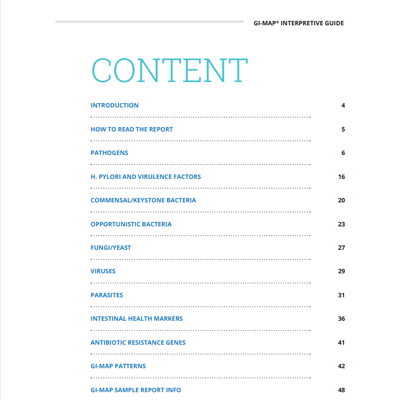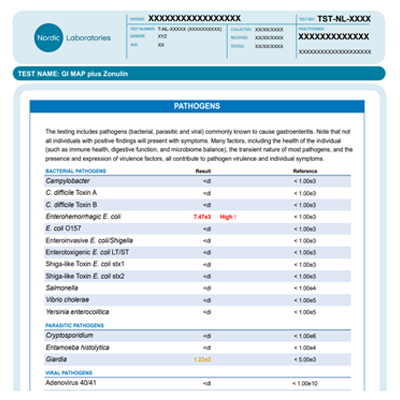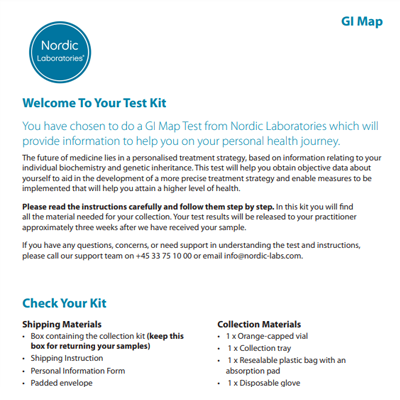GI-Map Test Stool Analysis
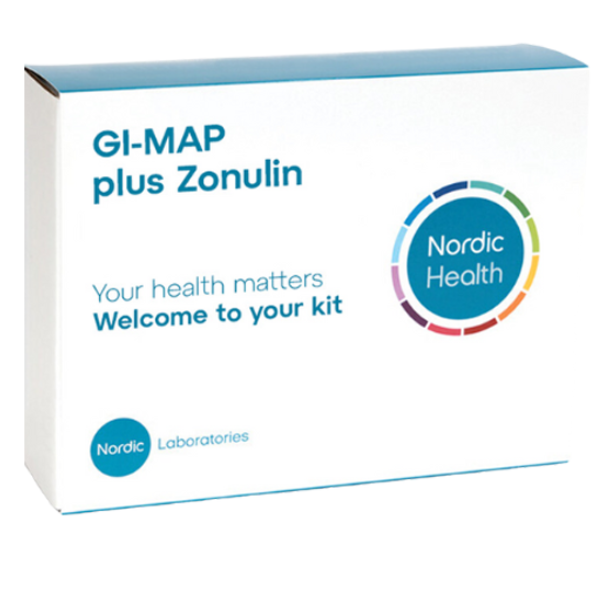
About the GI-MAP Test – Comprehensive Stool Testing
The Gastrointestinal Microbial Assay Plus (GI-MAP) was designed to assess a patient’s microbiome from a single stool sample, with particular attention to microbes that may be disturbing normal microbial balance and may contribute to perturbations in the gastrointestinal (GI) flora or illness.
The panel is a comprehensive collection of microbial targets as well as immune and digestive markers. It screens for pathogenic bacteria, commensal bacteria, opportunistic pathogens, fungi, viruses, and parasites. It primarily uses multiplex, automated, DNA analysis to give integrative and functional medicine practitioners a better view into the gastrointestinal microbiome. Zonulin has been identified as a key biomarker for intestinal permeability, which has been associated with celiac disease, non-celiac gluten sensitivity (NCGS), and other GI and systemic conditions.
Investment To You:
- £395 Lab Fee
- £300 Consultation Fee
Panel available for clients in UK, Ireland and the Channel Islands.
Extra shipping charges may apply outside of the UK.
Why Choose the GI-MAP Test
Microscopy and culture-based tests are familiar, but they have limitations with sensitivity, specificity, and identifying anaerobic organisms. That is why almost no peer-reviewed GI microbial research studies have used microscopy and culturebased testing methods in over 20 years.
It is estimated that there are over 200 million cases of Gastrointestinal disease each year in the United States. Acute or chronic diarrhea caused by a bacterial, viral, or parasitic pathogens present in the GI tract, account for a significant proportion of the cases. Many of these cases often go undiagnosed and untreated.
For individuals with symptoms of:
• Chronic and Acute Gastroenteritis
• IBD-Infammatory Bowel Disease
• IBS-Irritable Bowel Syndrome
• Autoimmune Disease
• SIBO
• Suspected H. pylori Infection
• Fungal or Yeast Infections
• Bacterial & Parasitic Infections
• Intestinal Permeability
• Viral Pathogens
GI-MAP includes these analytes:
• Bacterial Pathogens
• Viral Pathogens
• Parasitic Pathogens
• Parasitic Protozoa
• Parasitic Worms
• Normal Bacterial Flora
• Opportunistic Bacteria
• H. pylori with Virulence Factors
• Fungi/Yeast
• Digestion
• Immune Response
• Inflammation
• Antibiotic Resistance Genes
• Add-on option: Zonulin
(Leaky Gut marker)
Who should consider the test?
GI MAP is a stool test, recommended for anyone who wishes to treat and prevent gastrointestinal disorders and/or enhance gastrointestinal function. This may be people who experience digestive symptoms such as bloating, constipation, diarrhoea, excessive gas, abdominal pain, irregular bowel movements, irritable bowel syndrome (IBS), inflammatory bowel diseases (Crohns, Celiac disease, Ulcerative colitis), food sensitivities, joint pain, vitamin or mineral deficiencies, inflammation, eczema, autoimmune diseases or suspected yeast or parasite infections. The test is also relevant for people who have received considerable amounts of antibiotics, NSAIDs or proton pump inhibitors, which may dysregulate the gastrointestinal microbiome.
What does the test show?
GI MAP test explores through the quantitative PCR method the combination
and concentration of microorganisms in the intestinal flora. The test reveals
both pathogens, commensal bacteria and dysbiotic flora, (beneficial), as well as
parasites and fungi. Furthermore, the analysis provides insight on intestinal health
markers related to digestive function, including absorption of fat, inflammatory
markers, as well as the intestinal immune status (secretory IgA) and gluten
antibodies. Zonulin is an add-on marker for this test, but can be analysed too.
What does the result mean for you?
The GI MAP test sheds light on more than 25 potential causes of related
symptoms. Based on the test result, individual treatment can be organised, not
only to alleviate symptoms, but to treat the underlying cause of the problem.
A treatment plan includes personalised nutrition and supplement
recommendations, as well as an assessment of how long the intervention
should be followed. The duration of the intervention depends on the person’s
requirements and response to treatment. The treatment plan may aim to eliminate
dysbiotic bacteria, restore beneficial intestinal flora (probiotics), balance the pH
value in the intestines, relieve inflammation and irritation of the intestinal lining and
support general digestive function.
In some cases, the test is performed again after 3-6 months, depending on the
individual situation.
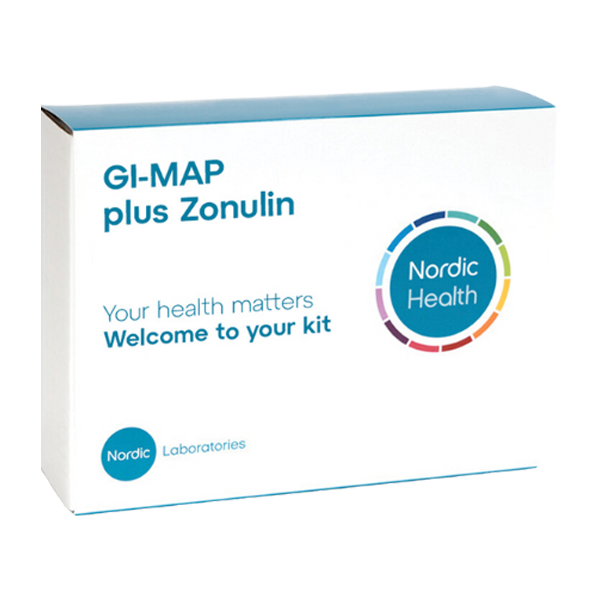
What Markers Are Tested In The Ultimate Stool Analysis?
The panel is a comprehensive collection of microbial targets as well as immune and digestive markers, and relies exclusively on quantitative polymerase chain reaction (qPCR) technology to detect parasites, bacteria, fungi, and more by targeting the specific DNA of the organisms tested.
Click here to view all of the biomarkers tested in this panel
Methodology
Quantitative polymerase chain reaction (qPCR)
Analytes
BACTERIAL PATHOGENS
- Campylobacter
- C. difficile Toxin A
- C. difficile Toxin B
- Enterohemorrhagic E. coli
- E. coli O157
- Enteroinvasive E. coli/Shigella
- Enterotoxigenic E. coli LT/ST
- Shiga-like Toxin E. coli stx1
- Shiga-like Toxin E. coli stx2
- Salmonella
- Vibro cholerae
- Yersinia enterocolitica
- H. pylori
- Virulence Factor, babA
- Virulence Factor, cabA
- Virulence Factor, cabPAI
- Virulence Factor, dupA
- Virulence Factor, iceA
- Virulence Factor, opiA
- Virulence Factor, vacA
PARASITIC PATHOGENS
- Cryptosporidium
- Entamoeba histolytica
- Giardia
VIRAL PATHOGENS
- Adrenovirus 40/41
- Norovirus GI
- Norovirus GII
NORMAL/COMMENSAL BACTERIA
- Akkermansia Mucinophilia
- Bacteroides fragilis
- Bifidobacterium spp.
- Clostridia (class)
- Enterobacter spp.
- Enterococcus spp.
- Escherichia spp.
- Faecalbacterium prausnitzii
- Lactobacillus spp.
BACTERIAL PHYLA
- Bacteroidetes
- Firmicutes
- Firmicutes/Bacteroidetes Ratio
ADDITIONAL DYSBIOTIC/OVERGROWTH BACTERIA
- Bacillus spp.
- Enterococcus faecalis
- Enterococcus faecium
- Methanobacteriaceae (family)
- Morganella spp.
- Pseudomonas spp.
- Pseudomonas aeruginosa
- Staphylococcus spp.
- Staphylococcus aureus
- Streptococcus spp.
POTENTIAL AUTOIMMUNE TRIGGERS
- Citrobacter spp.
- Citrobacter freundii
- Fusobacterium spp.
- Klebsiella spp.
- Klebsiella pneumoniae
- Mycobacterium avium subsp. paratuberculosis
- Prevotella spp.
- Proteus spp.
- Proteus mirabilis
FUNGI/YEAST
- Candida albicans
- Candida spp.
- Geotricum spp.
- Microsporidia spp.
- Rhodoturula spp.
OPPORTUNISTIC VIRUSES
- CMV- Cytomegalovirus
- EBV- Epstein Bar Virus
Parasites and Worms
PROTOZOA
- Blastocystis hominis
- Chilomastix mesnelli
- Cyclospora spp.
- Dientamoeba fragilis
- Endolimax nana
- Entamoeba coli
- Pentatrichomonas hominis
WORMS
- Ancyclostroma duodenale
- Ascaris lumbricoides
- Necator americanis
- Trichuris trichiura
- Taenia spp.
Intestinal health markers:
DIGESTION
- Elastase-1
- Steatocrit
IMMUNE RESPONSE
- SIgA
- Anti-gliadin SIgA
INFLAMMATION
- Calprotectin
GI MARKERS
- ß-Glucuronidase
- Occult Blood - FIT
ZONULIN
Antibiotic resistance genes (Optional add-on):
Phenotypes | HELOBACTER
- Amoxicillen
- Clarithromycin
- Fluroquinolines
- Tetracycline
Where Can I Find The Full Test Information?
How Do I Book?
Step One
PAY PHIL'S CONSULTATION FEE
Book and pay for the consultation with Phil Richards. Once you have paid the consultation fee, Phil will send you an online Health Questionnaire and a 7-day Weekly Food Diary questionnaire, so that once your results are received by Phil he can interpret them correctly and tailor the advice to suit your needs.
PLEASE NOTE: There is only one consultation fee of £300 to be paid regardless of how many panels you purchase within a 48 hour period.
Step Two
PURCHASE TEST WITH Nordic Laboratories
Please purchase the Stool Analysis test with our partner Lab (Nordic Laboratories) by clicking the button below. This will open up a new browser tab with the Nordic Laboratories purchase page and you should use this page to purchase this test directly with them.
What Happens Next?
1.
YOU WILL RECEIVE AN EMAIL CONFIRMATION FROM PHIL RICHARDS INCLUDING AN ONLINE HEALTH QUESTIONNAIRE AND SEVEN DAY FOOD DIARY
After you have paid the Consultation Fee, you will receive an email from Phil Richards enclosing a Health Questionnaire and a Seven Day Food Diary. It is imperative that you complete all of the Questionnaires that Phil emails to you as quickly as possible (and definitely within 10 – 14 days) to allow him to review the information in preparation of receipt of your stool results.
2.
YOU WILL RECEIVE YOUR STOOL KIT IN THE POST FROM PARTNER LAB Nordic Laboratories WITHIN 7 – 10 DAYS FROM ORDER
It is important that YOU read the enclosed TEST and SHIPPING instructions on receipt of the kit to ensure the draw is successful avoiding the need to order and pay for a second kit.
3.
YOU WILL RECEIVE AN EMAIL FROM PHIL RICHARDS TO ADVISE YOU HE HAS RECEIVED YOUR STOOL RESULTS AND TO ARRANGE A ZOOM CONSULTATION
4.

